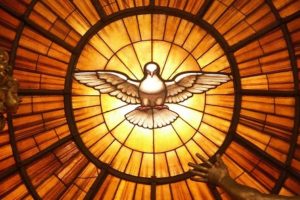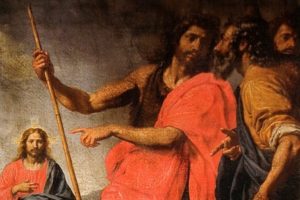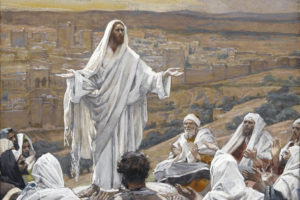Last edited on 9/Jul/2020
Introduction
Now while the Pharisees were gathered together, Jesus asked them a question, 42 saying, “What do you think about the Christ? Whose son is he?” They said to him, “The son of David.” 43 He said to them, “How is it then that David, in the Spirit, calls him Lord, saying,
44 “‘The Lord said to my Lord, Sit at my right hand, until I put your enemies under your feet’?
45 If then David calls him Lord, how is he his son?” 46 And no one was able to answer him a word, nor from that day did anyone dare to ask him any more questions. (Matthew 22:41–46)
The Pharisees were a religious group within Judaism that adhered very strictly to the Old Testament Law during Jesus’ time, and everyone looked up to them as teachers and experts concerning the Hebrew Scriptures. In spite of this, though, Jesus condemned the Pharisees on various occasions for the man-made traditions they forced on people that God’s Word did not command. In addition, the Pharisees wanted to arrest and even kill Jesus because of his healing miracles, his exorcisms, and because his teachings often contradicted their own.
Jesus Refutes the Pharisees
At the beginning of this passage, we see that while the Pharisees gathered near Jesus, he saw this as an opportunity to test their knowledge of the Scriptures by posing them a rather peculiar question: “What do you think about the Christ? Whose son is he?”
Christ is just the Greek word for Messiah that’s mostly used in the New Testament, so the two terms can be used interchangeably. At first glance it seems like a rather obvious question for the Pharisees. After all, they were experts on the Scriptures and knew all about the Old Testament passages which teach that the Messiah would be a descendant of king David (Isaiah 9:6–7; Isaiah 11:1–2; Psalm 89:3–4; Psalm 132:11). So they correctly responded by saying: “The son of David.”
What’s interesting, though, is that using the Bible as his authority, Jesus then immediately questioned their answer by making reference to Psalm 110:1, saying:
How is it then that David, in the Spirit, calls him Lord, saying, 44 “‘The Lord said to my Lord, Sit at my right hand, until I put your enemies under your feet’?
But if the Pharisees gave a biblical answer, why then did Jesus refute them using the Scriptures? Well you see, the Pharisees were not wrong in just saying that the Messiah is David’s son or descendant; they were wrong in thinking that he was just that.
You see, to the Pharisees, the Messiah was nothing more than a human, created by God in the womb of one of David’s descendants. In this way, he would have been quite literally just “the son of David”. But this belief was exactly what Jesus was challenging here: if the Messiah really is just another descendant of David’s, then how come David himself, inspired by the Holy Spirit, calls his future son his Lord?
David Recognised the Deity of the Messiah
The way David addressed the Messiah is not the way a father would address his son. In fact, David even refrained from calling the Messiah his son or offspring, and instead called him his Lord. To call someone Lord is to make them above you, and a father is not below his son, much less a king below his prince.
In fact, the way David addressed the Messiah is one of the ways in which one would address God, because “Lord” (Adonai in the Hebrew and Kyrios in the Greek) is actually a title of deity in both the Old and New Testaments, and is attributed to both God the Father and the Lord Jesus Christ many times (Genesis 15:2; Romans 10:9–10), as well as the Holy Spirit (2 Corinthians 3:17–18). By addressing the Messiah in such a high way, David saw him as being someone far more than just his son.
What’s more is that David was addressing his unborn son. To David, the Messiah was not his future Lord as soon as he comes; the Messiah was David’s Lord in the present, because he plainly called him “my Lord”. David recognised the Messiah’s Lordship over him as a present reality, not just a future event to wait for. In other words, David recognised the Messiah’s pre-existence.
Moreover, we see in the Psalm that the Lord—Adonai / Kyrios, the Messiah—sits at the right hand of the Lord—Yahweh, the Father. To be seated at the right hand of God is to hold the highest position possible in Heaven and on Earth: equality with God. Being seated at God’s right hand, the Messiah has all power, authority, and glory in Heaven and on Earth, and one day, all of his enemies will be completely subjected to him. In this Psalm, the Holy Spirit had revealed to David that in the Messiah’s heavenly pre-existence, he holds a position in which both he and God are equals, and so David, recognising the full deity of the Messiah, addressed him by the divine title Adonai.
The Messiah Is God’s Son
To conclude his masterful response, Jesus then posed them yet another question: “If then David calls him Lord, how is he his son?” The Pharisees were so sure this whole time that the Messiah was just David’s son, a normal, created human being like anyone else, that at that point they were at a loss for words; they had just found out that their beliefs were unscriptural. The whole point of Jesus’ lesson here was to make the Pharisees rethink their preconceived ideas and assumptions about the Messiah.
This now leaves us with the question Jesus posed in the beginning about the Christ: “Whose son is he?” If David calls the Messiah Lord, how is he his son? The Pharisees could not answer this question because they did not have the full picture of who he truly is. But once we recognise the Messiah’s deity, like David did, the answer is easy: the Messiah is not just the son of David or a son of man from Earth, he is also—and ultimately—the Son of God from Heaven.
As a man, the Messiah is indeed David’s son, but as the Lord or Adonai, the Messiah is God’s Son. As David’s son, the Messiah truly did come in the flesh; as God’s Son, the Messiah existed eternally in Heaven before coming in the flesh. As David’s son, the Messiah has a human nature; as God’s Son, the Messiah also has a divine nature. As David’s son, the Messiah is as equally human as David is; as God’s Son, the Messiah is as equally God as the Father is. This is why God’s Son, the Messiah, is seated at the Father’s right hand as his full equal in governing Heaven and Earth, because the two of them share the same divine nature and essence.
We see that the Messiah is God’s Son when Jesus asked his twelve disciples who he was in chapter 16 of Matthew’s Gospel. St Peter answered: “You are the Christ, the Son of the living God.” (Matthew 16:16) Peter not only recognised that Jesus was the Messiah who was prophesied in the Scriptures, but that as the Messiah, he was even God’s Son. What was Jesus’ answer to him?
Blessed are you, Simon Bar-Jonah! For flesh and blood has not revealed this to you, but my Father who is in heaven. (Matthew 16:17)
Conclusion
The Pharisees were intelligent people, but they were spiritually blind. They knew the passages about the Messiah, but not what they taught about him. They knew the Scriptures well and taught them to others, but they couldn’t see the Lord Jesus in them (John 5:39–40, 46–47). But Peter, a humble, uneducated fisherman and faithful follower of the Lord Jesus, could see that he was the promised Messiah, the Son of the living God, not because of anything he did or because he chose to, but because God chose to reveal it to him.
So at the end of the day, none of us can say that we were wise or smart enough to choose the Lord Jesus by our own free will, and figure out that he is our Messiah, because we were all once just as equally blind as many of the Pharisees were (Ephesians 2:1–2). Instead, we must acknowledge along with St Paul, who once called himself the chief of all sinners:
For by grace you have been saved through faith. And this is not your own doing; it is the gift of God, 9 not a result of works, so that no one may boast. (Ephesians 2:8–9)
Let’s all give thanks to God our Father for giving us the Holy Spirit, who gave us the gift of faith to believe in Jesus, our Lord and Messiah, who died for our sins on the cross and rose again on the third day, so that all who believe in his name may receive forgiveness of sins and eternal life. Amen.







